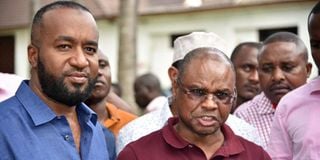Premium
Priorities of Coast governors Hassan Joho, Salim Mvurya and Amason Kingi

Mombasa Governor Hassan Joho and his Kilifi counterpart Amason Kingi address journalists during a past event.
As the political landscape is expected to change in the next few months ahead of the 2022 General Election, three of the six Coastal governors who are completing their two constitutional terms in office have prioritised a number of legacy projects in their last budgets, as others focus on delivering election promises.
Governors Salim Mvurya (Kwale), Hassan Joho (Mombasa) and Amason Kingi (Kilifi) — in their final terms — have prioritised education and community empowerment projects.
The Kwale governor is investing most of his budget in completion of a Sh600 million fruit processing plant in Shimba Hills. The project is in its final phase and will likely be complete by mid-next year.
County Chief of Staff Rodgers Chimega said the construction of the plant started in 2019, while the second phase began last year and is set to be completed by mid-2022.
Another landmark project by Mr Mvurya is the Sh300 million teacher training college, which will be the first teachers’ college in the county and the second largest public one in the Coast.
Mr Chimega said the county will also invest in the Sh120 million Kombani Fresh Produce Market in Matuga.
Affordable housing
The Mombasa County government has prioritised affordable housing, infrastructure and health as Mr Joho’s term comes to an end. Mr Joho’s second term is focusing on affordable housing projects in Buxton, Likoni and Changamwe sub-counties and collaboration with the national government on a number of projects.
“The Buxton project has begun, but the ones in Likoni and Changamwe are yet to begin. Investors have shown interest and it will not take a long time before the projects take off,” said County Acting Secretary Joab Tumbo.
Mr Joho has also allocated a huge chunk of his budget on improving access to affordable quality healthcare by ensuring operationalisation of the hospitals in each of the six sub-counties. His administration also intends to partner with the national government in the construction of a number of special economic zones, including in Miritini and Dongo Kundu.
Mr Kingi has dedicated his last term in office to complete the Kilifi County Medical Complex at the Kilifi County Hospital, and wants to clear all pending bills to comply with the National Treasury requirement.
The multimillion-shilling health care project was launched in 2018, with the first phase allocated Sh300 million, while the World Bank funded the project to the tune of Sh150 million.
Iirrigation schemes
In Tana-River, Governor Dhadho Godhana is focusing on completing the cluster programme and boosting local economies through agriculture.
Mr Godhana has allocated Sh500 million to move families in flood-prone areas to 14 locations.
In agriculture, Mr Godhana’s administration hopes it will get a chance to revive minor irrigation schemes where 14 projects have been allocated Sh6 million each.
In Taita-Taveta, the county has in the past one year invested millions of shillings in healthcare.
Among the major projects Governor Granton Samboja is focusing on is the Sh60 million Covid-19 centre and ICU, now at an advanced stage at the Mwatate Sub-county Hospital. The Health department has also constructed a Sh14 million oxygen plant at Moi County Referral Hospital in Voi and established a cancer centre.
Some of the projects have, however, stalled due to financial constraints caused by delay of funds from the Treasury.
In Lamu, Governor Fahim Twaha has prioritised education, with the county allocating Sh256 million for bursary and scholarships for students.
Land ownership has also been given priority, and the county has announced a plan to ensure 20,000 squatters are resettled before 2022.
So far, at least 7,000 squatters have been offered land and title deeds, whereas surveys are being undertaken in Mokowe, Kiunga, Mpeketoni, Witu, Hindi and other areas. The county has set aside more than Sh100 million for water projects. Installation of water desalination plants has been initiated in Siyu, Ndau, Kiunga and Magogoni.
Reports by Siago Cece, Kalume Kazungu, Lucy Makanyika, Stephen Odour and Maureen Ongala.





